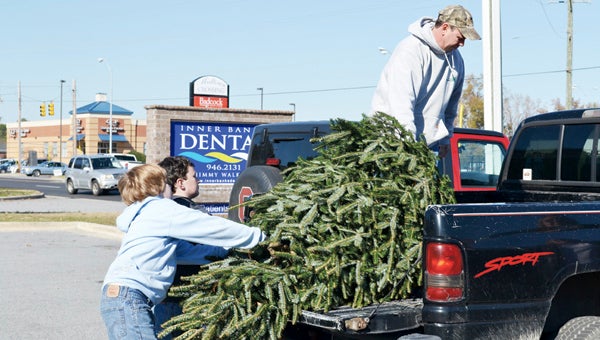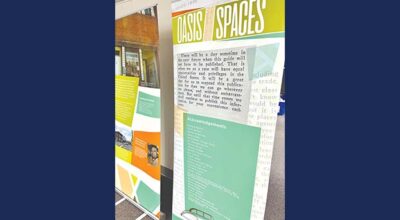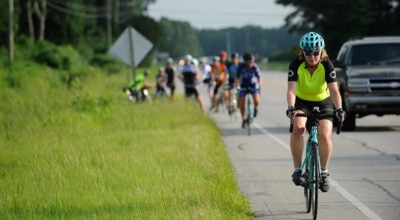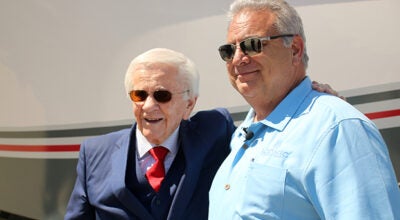Scouts selling Christmas trees
Published 5:58 pm Wednesday, November 26, 2014

FILE PHOTO | DAILY NEWS
A HOLIDAY TRADITION: Ben Crawford (left) and Kevin White (center) help Bill Gales load a Christmas tree into the bed of Gales’ pickup truck during last year’s Christmas-tree sales.
A holiday tradition in Washington returns — Boy Scout Troop 99 is selling Christmas trees.
On weekdays, the Fraser firs will be sold from 11 a.m. to 8 p.m. On weekends, the fragrant firs will be sold from 8 a.m. to 9 p.m., according to John Ingram, one of the troop leaders. The lot is next to Dr. Jimmy Walker’s dental office at 629 W. 15th St. Walker allows the Scouts to use the vacant lot at no cost.
The trees range from about 6 feet to 10 feet tall.
Scouts work at the lot, doing various tasks such as setting up the trees and carrying them to customers’ vehicles. They also help trim lower branches from the trees to improve the trees’ appearance.
“The Boy Scouts and the parents help sell the trees,” Ingram noted.
Ingram said the trees come from the same supplier that Troop 99, which is sponsored by Washington’s First United Methodist Church, used last year. The troop usually orders about 220 Fraser firs each year.
“The trees cost anywhere from about $65 to $130,” Ingram said.
“We’ve been doing it for quite a few years. I’m not sure how may. I’ve been in Scouts four about five years. We’ve been doing it for that long I know. Part of the sales, we recoup are money from. The rest is divvied up between the boys who have done the work on the tree sales, for the time they put in there, which helps them go to camp and helps them be able to go place to learn different aspects of every thing we do at Boy Scouts,” Ingram said.
The troop has regular customers for its Christmas trees. Those customers return year after year to help support the Boy Scouts and their work in the community.
The Fraser fir, according to area Christmas-tree sellers, is the preferred tree bought by area consumers. Other species sold for use as Christmas trees include white pine, Virginia pine and Norway spruce, according to the N.C. Department of Agriculture & Consumer Services.
North Carolina has 1,600 growers producing an estimated 50 million Fraser fir Christmas trees growing on over 25,000 acres, according to the North Carolina Christmas Tree Association in Boone. Fraser fir trees represent more than 90 percent of all species (used as Christmas trees) grown in North Carolina. The North Carolina Christmas tree industry ranks second in the nation in number of trees harvested annually.
Sidebar
Caring for a Christmas tree
Now that your special tree has been selected, it needs to be cared for in a manner similar to a fresh bouquet of flowers. It should be placed in water immediately. If for some reason the tree is not placed in water for more than twelve hours after it is harvested in the field, a fresh cut should be made by removing half an inch from the base of the trunk before placing the tree in a stand. The stand should be kept full of water throughout the season. A Christmas tree may take up to a gallon of water the first 24 hours and several pints each day thereafter.
Keeping the tree in water is the most important part of Christmas tree care. Special preservatives such as sugar, aspirin or cola are not required to preserve freshness. All that is needed is plain, clean tap water in sufficient quantity to keep the base of the tree covered at all times.
Christmas trees should be placed in cool areas away from drafts and potential sources of warm air. Trees should not be placed near fireplaces, heaters, furnace vents or television sets.
Christmas trees do not cause fires, but they should be handled to prevent being placed near sources of ignition. Light cords and connections used on the tree or in other holiday decorations must be in good working order to ensure a safe and joyous holiday season. Lights should always be unplugged when leaving home or going to bed.
Source: N.C. Department of Agriculture & Consumer Services






